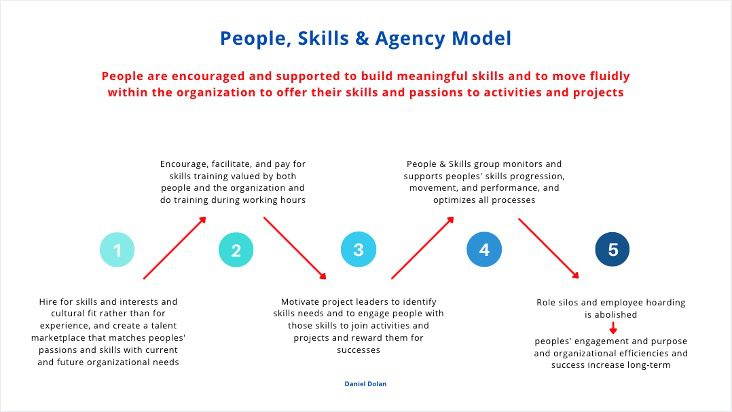Employee demand for meaningful skills training is clear and employers are beginning to get on board. Consider these findings from a June 2021 Gallup survey of more than 15,000 working or “waiting to work” adults in the United States:
“The data reveal that U.S. workers and their employers receive clear benefits from upskilling programs, including an additional 8.6 percent in annual income (about $8,000 on average) for workers, promotion opportunities, higher job satisfaction, greater retention and an increased standard of living. Workers say they have a very high interest in employer-provided upskilling, primarily to help advance their careers, but it is a demand their employers are only partially meeting.”
In uncertain times, many business leaders tend to retrench, cut and conserve. But as the title of Ryan Buell’s fall HBR article argues, “Elevate Employees, Don’t Eliminate Them.” As we begin slowly to emerge from the chaos of the pandemic, the key is to invest more in people, not less. Organizations should honestly evaluate the degree to which care for people informs organizational processes, rules and activities, and move quickly to support employee purpose.
Employees want more than just skills training
We hear a lot about a “skills crisis” but that is too simplistic. This is an agency and purpose crisis.
“Employees want to determine when and where they work. They want to work with a diverse team. They want to be measured on the value they deliver, not the volume they deliver. And they expect to be given the space and trust they need to do their very best work, wherever they happen to be.” — Tim Minahan, HBR May 2021, “What Your Future Employees Want Most“
Organizations that care for their people by providing flexibility, empathy and purpose in addition to skills training will be the winners. The importance of purpose at work is not about employee neediness.
Consider these findings from a 2021 McKinsey report:
“Employees expect their job to bring a significant sense of purpose to their lives. Employers need to help meet this need, or be prepared to lose talent to companies that will…70 percent of employees said that their sense of purpose is defined by their work…when employees feel that their purpose is aligned with the organization’s purpose, the benefits expand to include stronger employee engagement, heightened loyalty, and a greater willingness to recommend the company to others.”
The people and skills model
Organizations must do more than claim to recognize the value of skills. They must create an entire infrastructure of skills support and purpose-directed care infused across all functions, processes and strategic decision-making. It is time for a people and skills transformation to replace the entrenched HR function.
First, let’s recognize that humans—the people that make organizations possible—are not resources for organizations to use like tools. People in organizations have challenges, dreams, talents and desires. People are emotional, psychological and social entities that thrive on respect, safety, community and belonging.
The Society for Human Resource Management, which has more than 300,000 members in 165 countries and 111,000 SHRM-certified professionals, lists workforce management as one of the HR functional areas in its Body of Competency and Knowledge. Although traditional HR activities likely offer various important value for efficient and successful functioning organizations, a people and skills model replaces the control and sanction features of workforce management with the choice and reward features of people support.
Think of your own interactions with HR in your workplace. I suspect that for most of us, communication from or with HR is not usually something that we look forward to because in our daily experiences HR monitors our time in the office, docks our pay or schedules our performance reviews.
Second, people and skills creates and supports what McKinsey refers to as a flow-to-work organizational culture that strips section-based ownership of people and encourages people to move fluidly when and where they can provide the most value to the organization and at the same time maximize their sense of purpose and growth. A focus on skills over roles allows organizations to move quickly and with the most effective talent and skills to solve problems and create value for stakeholders.

The people, skills and agency model ideally is part of what Deloitte calls “opportunity—or talent—marketplaces” that are “platforms that make visible and communicate to workers defined opportunities for professional development, training, mentorship, project participation, networking, promotion, diversity, and inclusion.” The key is to offer people choice and opportunity for learning and skills development valued by the organization as those organizational needs and technologies change over time.
Organization leaders must champion people and skills
Creating and sustaining a skills-focused caring organization requires demonstrated buy-in and commitment from leaders who recognize the importance of promoting employees’ sense of organizational purpose, agency and satisfaction through empathy, skills training and flexible flow-to-work practices.
Begin by transforming your existing HR function to serve people in your organization with caring and support rather than control. If your current HR specialists are unwilling or unable to drive the new people and skills function, hire a skills-aligned expert to lead the effort. Reward rather than sanction.
Align all organizational activities around skills rather than roles, identify what Gartner calls “skills adjacencies,” and actively encourage employees to gain skills that they and the organization value. Make skills training available during work hours, pay for that training, elicit feedback on the quality of that training, make improvements, and make sure employees have opportunity to share those skills in projects.
Caring organizations centered around people and skills soon will be expected by people in the same way that company-purchased computers are expected. To get there we need active collaboration by local and national government agencies, sufficient funding for workforce development, secondary and postsecondary institutions that provide durable (human) skills and in-demand skills training, intermediaries that support skills training by publishing actionable data and linking actors, and employers that care comprehensively for people who do the work of the organization. It’s a big job and the urgency is fierce, so we must do this together.












